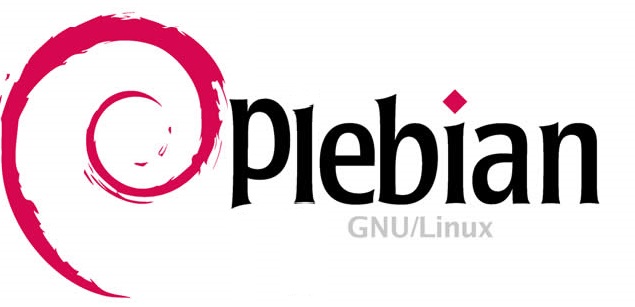hello friends! new(ish)!
Debian: Difference between revisions
>Muh6trillion mNo edit summary |
>Meguka |
||
| (19 intermediate revisions by 11 users not shown) | |||
| Line 1: | Line 1: | ||
[[File:debian-logo-large.png|thumb|Debian GNU+Linux]] | [[File:debian-logo-large.png|thumb|Debian GNU+Linux]] | ||
[https://debian.org Debian] is a [[GNU/ | [[File:plebian.jpg|thumb|Plebian GNU/Linux]] | ||
[https://debian.org Debian] is a [[GNU/Linux]] distribution. Debian is notable for being one of the earliest distributions, and one of the most influential. Debian comes with no proprietary software by default, nor is there any in the default Aptitude repositories, but the [[FSF]] damns Debian as they host non-free software on the same server. | |||
Debian was originally a combination of Deb and Ian, Deborah the name of Ian's girlfriend at the time. | |||
__toc__ | __toc__ | ||
==Getting Debian== | == Why use Debian? == | ||
The average Debian .iso installation files can be found at https://www.debian.org/distrib/, and live CDs can be found at | * Can be as bare as desired; often used on servers. | ||
===Which version?=== | * Stable is renowned for being ''stable''. | ||
* Easy to customize/[[GNU/Linux ricing|rice]]. | |||
* Excellent selection of software. | |||
* The Debian Project often does neat things, like Debian/kFreeBSD and Debian/Hurd. | |||
== Getting Debian == | |||
The average Debian .iso installation files can be found at https://www.debian.org/distrib/, and live CDs can be found at https://www.debian.org/CD/live/ | |||
=== Which version? === | |||
Debian comes in three flavors: Stable, Testing, and Unstable. | Debian comes in three flavors: Stable, Testing, and Unstable. | ||
*Stable is most often used in servers, and by users who do not like updating often and don't mind more out-dated software. | * Stable is most often used in servers, and by users who do not like updating often and don't mind more out-dated software. | ||
*Testing is more up-to-date than Stable, and is the most common for desktop usage. | * Testing is more up-to-date than Stable, and is the most common for desktop usage. | ||
*Unstable is the most up-to-date, but may contain bugs because it's ''unstable''. | * Unstable is the most up-to-date, but may contain bugs because it's ''unstable''. | ||
===Which desktop/kind? | |||
=== Which desktop/kind? === | |||
The default Debian installation .iso will install the GNOME 3 | The default Debian installation .iso will install the GNOME 3, but you can also install it with KDE, XFCE, LXDE, or even without any kind of graphical environment, see [[GNU/Linux Ricing#Desktop Environments]]. | ||
==== Network Installation ==== | |||
====Network Installation==== | |||
Network installation, or ''netinst'', is the minimal installer. The .iso contains only the software to boot and download more software. This is what you would want if you are installing Debian on a server, or want to build up your environment from scratch. | Network installation, or ''netinst'', is the minimal installer. The .iso contains only the software to boot and download more software. This is what you would want if you are installing Debian on a server, or want to build up your environment from scratch. | ||
==Installing Debian== | |||
After downloading your preferred installation media, burn the .iso to a CD or DVD. Then, throw away the CD/DVD and make a bootable USB using UNetBootin. | == Installing Debian == | ||
After downloading your preferred installation media, burn the .iso to a CD or DVD. Then, throw away the CD/DVD and make a bootable USB using UNetBootin. | |||
Jam your USB flash device | |||
Jam your USB flash device in your machine and during boot, press whichever button allows you to select boot device. It is usually F10 or F12, but may be F2, or the Delete key. If you can't figure it out for yourself, perhaps [[Gentoo]] will fit you better. | |||
Your machine should now be booting your Debian installation media, and now you just have to | |||
If | Your machine should now be booting your Debian installation media, and now you just have to press the right buttons which you will be told to press by the installation process. | ||
*Have corrupt install media. | |||
* | If something goes wrong, you may: | ||
* | * Have corrupt install media. | ||
* Have a broken device. | |||
* Have already installed Gentoo. | |||
== Changing APT Repositories == | |||
At some point you might want to upgrade to Testing, or install non-free drivers and/or firmware. | |||
You may do so by modifying sources.list with your favorite text editor. | |||
<pre>sudo nano /etc/apt/sources.list</pre> | |||
<pre> | |||
deb http://site.example.com/debian testing main non-free contrib | |||
deb-src http://site.example.com/debian testing main non-free contrib | |||
</pre> | |||
<pre>apt-get update</pre> | |||
If you changed distributions from Stable to Testing or Unstable, you should instead type: | |||
<pre>apt-get dist-upgrade</pre> | |||
== The Death of the Creator == | |||
In 2017, the creator of Debian made a series of tweets claiming that he was harassed by a cop outside his home. He continued to make more and more tweets, speaking out against the Police State, as well as criticism of Black Lives Matter and other races. | |||
Eventually, the tweets stopped. It was discovered the next day that Ian had committed suicide. He was found in his bathtub by a friend who had come to check up on him. | |||
[[Category:GNU/Linux]] | [[Category:GNU/Linux]] | ||
[[Category:Distros]] | |||
[[Category:Operating systems]] | |||
Latest revision as of 22:17, 18 December 2020
Debian is a GNU/Linux distribution. Debian is notable for being one of the earliest distributions, and one of the most influential. Debian comes with no proprietary software by default, nor is there any in the default Aptitude repositories, but the FSF damns Debian as they host non-free software on the same server.
Debian was originally a combination of Deb and Ian, Deborah the name of Ian's girlfriend at the time.
Why use Debian?
- Can be as bare as desired; often used on servers.
- Stable is renowned for being stable.
- Easy to customize/rice.
- Excellent selection of software.
- The Debian Project often does neat things, like Debian/kFreeBSD and Debian/Hurd.
Getting Debian
The average Debian .iso installation files can be found at https://www.debian.org/distrib/, and live CDs can be found at https://www.debian.org/CD/live/
Which version?
Debian comes in three flavors: Stable, Testing, and Unstable.
- Stable is most often used in servers, and by users who do not like updating often and don't mind more out-dated software.
- Testing is more up-to-date than Stable, and is the most common for desktop usage.
- Unstable is the most up-to-date, but may contain bugs because it's unstable.
Which desktop/kind?
The default Debian installation .iso will install the GNOME 3, but you can also install it with KDE, XFCE, LXDE, or even without any kind of graphical environment, see GNU/Linux Ricing#Desktop Environments.
Network Installation
Network installation, or netinst, is the minimal installer. The .iso contains only the software to boot and download more software. This is what you would want if you are installing Debian on a server, or want to build up your environment from scratch.
Installing Debian
After downloading your preferred installation media, burn the .iso to a CD or DVD. Then, throw away the CD/DVD and make a bootable USB using UNetBootin.
Jam your USB flash device in your machine and during boot, press whichever button allows you to select boot device. It is usually F10 or F12, but may be F2, or the Delete key. If you can't figure it out for yourself, perhaps Gentoo will fit you better.
Your machine should now be booting your Debian installation media, and now you just have to press the right buttons which you will be told to press by the installation process.
If something goes wrong, you may:
- Have corrupt install media.
- Have a broken device.
- Have already installed Gentoo.
Changing APT Repositories
At some point you might want to upgrade to Testing, or install non-free drivers and/or firmware.
You may do so by modifying sources.list with your favorite text editor.
sudo nano /etc/apt/sources.list
deb http://site.example.com/debian testing main non-free contrib deb-src http://site.example.com/debian testing main non-free contrib
apt-get update
If you changed distributions from Stable to Testing or Unstable, you should instead type:
apt-get dist-upgrade
The Death of the Creator
In 2017, the creator of Debian made a series of tweets claiming that he was harassed by a cop outside his home. He continued to make more and more tweets, speaking out against the Police State, as well as criticism of Black Lives Matter and other races.
Eventually, the tweets stopped. It was discovered the next day that Ian had committed suicide. He was found in his bathtub by a friend who had come to check up on him.

